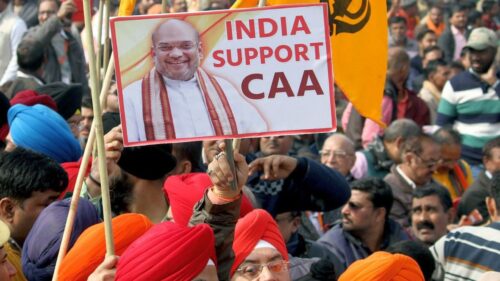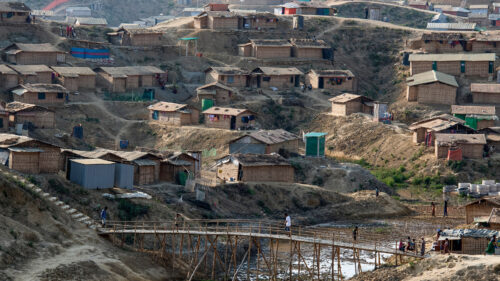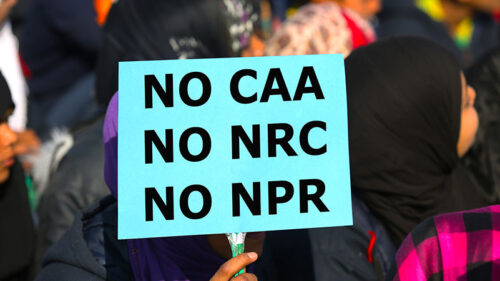A shadow of doubt and anxiety hangs as India might institute a National Register of Citizens (NRC) across the country. This measure would document all Indian citizens so that illegal immigrants can be identified. Many of these immigrants are of Bangladeshi origin.
The complex demographics of the Indian subcontinent, where country lines are blurred and communities converge, are at the core of the issue. Bangladesh shares a long, porous border with India across which both people and goods easily pass. The NRC threatens to upset the balance between the two neighbors.
To date, India has not executed its census scheduled for 2021 nor compiled an updated National Population Register, which is supposed to be the first step toward expanding the NRC. Additionally, in 2019, Prime Minister Narendra Modi publicly declared that the BJP had no plans for a nationwide NRC. However despite this statement, Modi’s recent move to implement the Citizenship (Amendment) Act (CAA), providing pathways to citizenship for non-Indian religious minorities, suggests a nationwide NRC scheme could be in the works.
Initially introduced in the state of Assam, the NRC is to be implemented nationwide, according to India’s Union Home Minister Amit Shah of the Bharatiya Janata Party (BJP). The BJP vowed to drive out all “illegal immigrants” before the 2024 Lok Sabha elections. The goal might sound nice for an election campaign, but does a nationwide NRC actually hold water?
The dark side of the NRC
In Assam, the NRC procedure has been a complete disaster. The Supreme Court of India received petitions from multiple Assamese organizations asking for a revision of the draft NRC. The high court put the process on hold. The state’s BJP-led administration themselves have declined to accept the current NRC draft as well, claiming that some names were erroneously included or excluded throughout the process.
An overwhelming amount of bureaucratic red tape and corruption will follow the already protracted process when people begin appealing to the Foreigner Tribunal (FT) to fix their NRC status. In the case of a nationwide NRC, this will be a living nightmare. A few years ago, Supreme Court senior advocate Sanjay Hegde commented on the measure, “How do you go about this entire exercise with a population of 1.25 billion people,” he asked, speculating that “700 to 800 million people may not even have birth certificates.”
The most bizarre issue, though, is that the nationwide NRC, which aims to identify the nation’s “true citizens,” will ultimately force Indians without documentation to apply through the CAA procedure by claiming to be Afghan, Pakistani or Bangladeshi.
The nationwide implementation of the NRC could also have far-reaching consequences for relations between India and Bangladesh. The two countries have had a historically complicated relationship, oscillating between harmony and conflict. A nationwide NRC could undo it all.
India has previously assured Dhaka that NRC is an internal matter and that Bangladesh has nothing to worry about. This intentionally delusional promise is not feasible as public and media discourse in India generally equates “illegal immigrants” to “Bangladeshis.” There are still no clear guidelines on what will happen to the so-called “infiltrators,” but it does not take much to conclude that their eventual fate will be eviction to Bangladesh.
The prospect of mass deportations from India is a grave humanitarian and diplomatic challenge. Bangladesh is already burdened with Rohingya refugees who are unlikely to be repatriated back to Myanmar. Despite already having the ninth-highest population density in the world, Bangladesh is currently hosting 1.1 million Rohingya refugees living in camps and is in no position to receive further arrivals.
Friends to enemies?
Beyond the deportation issue, nationwide enforcement of the NRC could have a widespread impact on sectors such as trade and security as well as people-to-people exchanges.
India–Bangladesh relations seemed to enter a golden age in 2023 when bilateral trade was valued at $15.9 billion and India invited Bangladesh to the G20 summit; however, steps taken towards the NRC could also be steps taken away from Bangladesh. Any contention related to the NRC risks pushing Bangladesh further towards China, its largest trade partner. India risks losing Bangladesh, an emerging hub of connectivity important for its Act East Policy aimed at improving relations and connectivity with Southeast Asian countries.
Furthermore, the potential displacement of millions could create fertile ground for radicalization and extremism. It’s no surprise that many people in Bangladesh harbor anti-India sentiments due to India’s alleged meddling in its internal matters, decades-long water-sharing issues related to the Teesta River and border killings by the Indian Border Security Force (BSF). This issue has created an atmosphere of public disdain and scorn directed towards India time and time again. The CAA and NRC are fanning the already burning flames of contempt between the two nations.
The last time the issue of immigrants gained such significant momentum was in 1979 in Assam, when tensions boiled over and resulted in the deaths of more than 1,000 residents of Bengali origin. Already enraged by CAA regulations, anti-Indian blocks in Bangladesh will see a nationwide NRC as further attacks on Islam, especially if the deportees are primarily Muslim. This may become the stick to target the Hindu population in the country. India’s curious case of xenophobia will pull Bangladesh into its dirty politics.
The BJP government must realize NRC is not an internal issue anymore if it risks causing a transborder humanitarian crisis. The mass deportations or the establishment of prison facilities for people classified as “illegal” is highly concerning and goes against India’s values as a democratic and humanitarian country. India must consider whether compiling a list of the country’s citizens is really worth the benefit if it comes at the cost of families being split apart, people being uprooted from their homes and vulnerable populations becoming stateless.
[Emma Johnson edited this piece.]
The views expressed in this article are the author’s own and do not necessarily reflect Fair Observer’s editorial policy.
Support Fair Observer
We rely on your support for our independence, diversity and quality.
For more than 10 years, Fair Observer has been free, fair and independent. No billionaire owns us, no advertisers control us. We are a reader-supported nonprofit. Unlike many other publications, we keep our content free for readers regardless of where they live or whether they can afford to pay. We have no paywalls and no ads.
In the post-truth era of fake news, echo chambers and filter bubbles, we publish a plurality of perspectives from around the world. Anyone can publish with us, but everyone goes through a rigorous editorial process. So, you get fact-checked, well-reasoned content instead of noise.
We publish 2,500+ voices from 90+ countries. We also conduct education and training programs
on subjects ranging from digital media and journalism to writing and critical thinking. This
doesn’t come cheap. Servers, editors, trainers and web developers cost
money.
Please consider supporting us on a regular basis as a recurring donor or a
sustaining member.
Will you support FO’s journalism?
We rely on your support for our independence, diversity and quality.










Comment